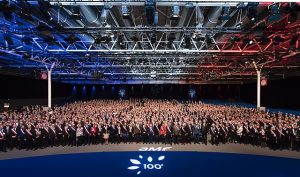


Dying at Work? Industrial Society and the Relationship to Risk
13 June 2022
Forestry Work: a Key to Fighting Global Warming?
13 June 2022In the social sciences, it has become a matter of course to consider and analyse the activities and office of elected officials as work. Commonly used expressions attest to this, such as “the representative’s job,” “political professionalisation,” “division of political labour,” etc. Yet a major component of this work—compensation for holding office—– has remained understudied. Our recent research therefore focuses on the remuneration of elected officials(1)This research was supported by the ANR: ELUAR project, led by Rémy Le Saout and completed in 2021. Cette recherche a été soutenue par l’Agence nationale de la recherche (ANR): , coordonné par Rémy Le Saout et achevé en 2021., to enrich the analysis of political work: what are the rules for calculating compensation, how much do elected officials earn, do they live off their compensation, and finally, are they compensated for working?
Holding Office: a Free or Compensated Job?

30 mayors with their scarves have settled in the millennial yew of Yvignac-la-Tour to set a world record for laughs. Source: Le Télégramme, April 30, 2022
The vast majority of the 516,595 political offices in France (counted as of January 1, 2018) are unpaid or practically unpaid: more than two thirds offer no compensation at all, just over 5% are compensated at more than 1,000 euros gross per month, and less than 0.25% at more than 5,000 euros for members of parliament, presidents of regional and departmental councils, and mayors of cities with more than 100,000 residents. Despite regulations, knowledge of the exact levels of compensation remains fragmentary because territorial assemblies have the ability to change the amounts—in limited ways and with a ceiling —– and because of the variety in rules setting the compensation for holding office in inter-municipal institutions.
In addition, the available data provides little information on the compensation actually received, because of the widespread practice in France of holding multiple offices. We do not have a good picture of office stacking practices, which are highly uneven. Although regulation in this area has tightened and established the incompatibility of stacking certain offices(2)For an overview of the provisions, which are quite extensive – in French, it does not seek to regulate remuneration, but rather to control the concentration of power. It also does not take into account inter-municipal offices and some executive functions (vice-presidency, deputy mayor).
Most of the 355,900 municipal councillors do not combine this position with other offices. As a result, a great majority of elected officials receive little or no compensation, cannot live off holding office, and devote themselves to their office for free or almost free. These observations converge with the results of surveys establishing that elected officials do not define their activities as work, especially paid work, but rather as a free service. Finally, most elected officials, including those with high salaries or full-time political engagements, seek to maintain an idealised representation of political activity, antithetical to work. They often frame it in terms of disinterestedness, vocation, selflessness, dedication to the public good, an honour, and a service that does not have to be paid. Without directly criticising the principle of compensation, they reject any assimilation of political activity with work. This assertion of disinterestedness, even when the office is remunerated, can be interpreted as a demarcation of the socially devalued figure of the political professional pursuing a career. But it is also indicative of the specific status of remuneration for elected officials.
Compensation for holding office that does not remunerate work?
Compensation for holding office was introduced in France in the middle of the 19th century for members of parliament(3)As part of the decree of 5 March 1848 instituting universal suffrage. For mayors and deputy mayors, an ordinance of October 1945 created the system of compensation for offices., in order to enable the involvement of people who needed to make a living and did not have enough time to hold office: it was justified more in terms of income loss from performing the functions of elected officials than in terms of activities conducted as part of holding office. The legitimacy of remunerating elected officials is based on a logic of compensation: the possible, voluntary, and non-compulsory withdrawal from professional activities following the commitment to an office is, in principle, compensated by an allowance associated with it. The amount of this allowance is fixed, independent of the loss of income resulting from professional withdrawal, and indexed to the type of office.

100th congress of the Association of Mayors of France, AMF (November 2017). Credits: AMF, CC BY-SA 4.0
Thus, compensation is not set according to the rules that usually govern the calculation of work remuneration: neither the volume of work time, nor the characteristics of the worker such as seniority or accumulated experience, skill or expertise level, performance or productivity, actual working time, etc. are taken into account.
Compensation is not subject to these modulations, which are often perceived as legitimate in many areas of activity: for each office, the level of compensation is independent of the elected official’s career, disconnected from the time devoted to the office, and dissociated from ways of investing in it. The compensation only opens the possibility of arbitrating between time devoted to paid employment and time devoted to politics, without setting any barometric constraints. Despite these conditions, elected officials do in at least some circumstances equate their compensation for holding office with work income.
Compensation for Holding Office and Professional Income
Indeed, the allowance loses these specificities when it becomes a means to make a living equivalent to work income (outside of holding office), be it a complement or substitute. A survey on political professionalisation revealed the ways elected officials combine political work and professional activity, and allowances and professional income. It shows the equivalencies and tradeoffs between two sources of remuneration, namely holding offices and jobs. Elected officials start to consider giving up their previous job or reducing their work hours and corresponding income when the respective levels of remuneration from holding office and from holding the job are close.
Various parameters are considered, such as employment status, conditions for possibly returning to the job, household income structure, family configuration, and assets and debts, in order to assess the advisability of making the office one’s main or exclusive activity. But it is always within a band of small differences: either it is a matter of limiting losses, or compensating for them by reducing agenda pressure, or maintaining or improving one’s income, generally in a modest way.
The survey also shows that compensation for holding office does not only involve compensation for a sacrifice, be it temporal, a professional career, financial gain, or personal life. It also involves an economic dependence, because “living from”, according to Max Weber’s famous expression, is also “depending on”: first, to receive an income is to be attached to the status from which it derives, even if it is combined with other remunerated activities; second, the political or activist engagement conducive to securing an office is in turn reinforced by the compensation; third, the financial rewards are distinguished by their structural fragility, since they are put back into play every electoral cycle. In this sense, holding office on a full-time or quasi-exclusive basis generates dependence and uncertainty, and is not strictly equivalent to paid professional activity or salaried work.

Mayor’s tricolor scarf. Credits: Claude Humbert, CC BY-SA 4.0
Another major difference lies in the absence of any remuneration benchmark, apart from the legal maximum allowed (set at 1.5 times the basic parliamentary allowance, i.e. 10,860 euros gross) and the conventional remuneration associated with each office (which does not inform individual situations given the office stacking options). Thus, our survey shows that the levels of remuneration at which elected officials consider to, or actually do, enter politics full time vary greatly, with some taking the leap as soon as their compensation reaches 2,200 to 2,500 euros gross per month, while others only begin to think about it at levels three times higher. Still others combine remuneration for holding office of more than 7,000 euros with their previous work and professional income.
Not only is remuneration independent of individual characteristics—of human capital—– and actual commitments and achievements; it is also framed by a formal salary order, i.e. a set of social norms to which actors refer when they seek to evaluate proposed or endorsed salary levels. While compensation levels are codified for each office, this does not establish, as in most professions, a reference framework for remuneration or a reference level of compensation. Consequently, the elected officials themselves define norms of acceptability via their conduct and their tradeoffs.
Finally, the compensation for holding office, and the use that some elected officials make of it to fully devote themselves to politics, do not make political activities akin to classic salaried work. On the contrary, the normative specificities of the remuneration system—compensation, flat-rate calculations, opacity resulting from office stacking, and the absence of a formal reference syst—– reinforce distancing from the “work” category. They support a strong claim for free service when holding office that does not challenge the principle of compensation, which remains solidly established but disconnected from any idea of work.
Didier Demazière, Centre of sociology of organisations
Bibliography
- Demazière D., Le Saout R. (dir.), 2021. Vivre de la politique : rémunération des élus et indemnisation des mandats, Revue française de Science politique
- Demazière D., Le Lidec P. (dir.), 2014. Les mondes du travail politique. Les élus et leurs entourages, Presses universitaires de Rennes
- Le Lidec P., 2012. in Travail politique. Dans Bevort A., Jobert A., Lallement M., Mias A. (dir.) Dictionnaire du travail, PUF, 804-809.
Didier Demazière is a sociologist at the CSO and is developing a sociology of work, employment, and professional groups, focused on labour markets. His research fields are unemployment and job searching; the career paths of elected politicians, captured at the intersection of electoral uncertainties and security mechanisms and through the prism of the material costs and rewards of political commitment; and the careers of professional athletes. In 2014 he published with Patrick Le Lidec “The worlds of political work: elected officials and their entourages”, and in 2021 he co-wrote with Rémy Le Saout “Making a living in politics. Remuneration of elected officials and compensation for holding office” in the French journal of political science. See his publications
Notes
| ↑1 | This research was supported by the ANR: ELUAR project, led by Rémy Le Saout and completed in 2021. Cette recherche a été soutenue par l’Agence nationale de la recherche (ANR): , coordonné par Rémy Le Saout et achevé en 2021. |
|---|---|
| ↑2 | For an overview of the provisions, which are quite extensive – in French |
| ↑3 | As part of the decree of 5 March 1848 instituting universal suffrage. For mayors and deputy mayors, an ordinance of October 1945 created the system of compensation for offices. |




